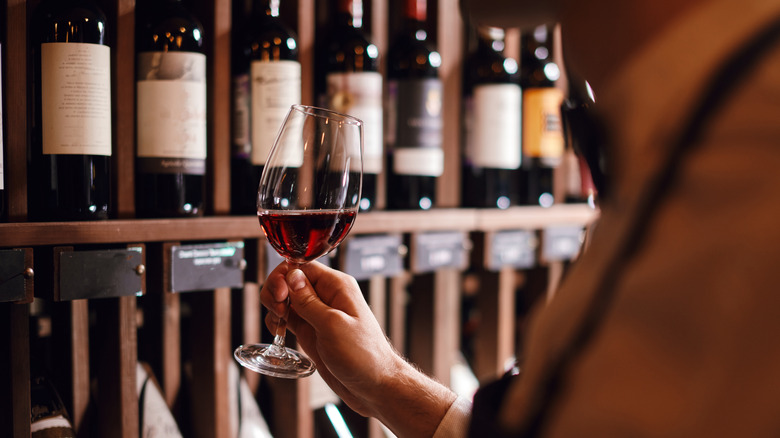Millions Of Spanish Wine Bottles May Have Falsely Been Labeled As French
If there is one thing in the food world you do not mess with it's the French and their wine. After all, this is the country that invented an entire system, the Appellation d'origine contrôlée or AOC, which authorizes products based on their place of origin, quality, and style, so they cannot be imitated. MasterClass says the system began back in 1411 to protect Roquefort cheese and in the early 20th century came to protect a whole range of French regional wines. Wines can even lose their AOC status if they fail quality checks in the years after they were first approved. Yes, the French take this stuff very seriously.
Today there are more than 360 different protected AOC wines and spirits in France, which Wine Folly says controls details as specific as grape varieties used and aging requirements, in addition to the regions the product must be made in. One big wine region that's not included in France's system? Spain. The neighboring Mediterranean nation is no slouch in the wine department by any means, but that doesn't mean you can go passing it off as French-made and expect people there to shrug their shoulders, which some importers have learned the hard way.
Cheap Spanish wine may have been labeled as Bordeaux
Wine identity theft is not a new problem in France: The Guardian reports that back in 2018, sellers were caught trying to pass off more than 10 million bottles worth of Spanish rosé as French. Now it seems imposters have come for one of France's classic reds, with Food & Wine saying 4.6 million bottles were recently passed off as a variety of French wines, including some high-end brands of Bordeaux. The plot allegedly included a middle-man buying cheaper wine from Spain and forging documents to make the wine appear French. And if you're not yet convinced France does not take their wine lightly, the perpetrators of these vineyard forgeries could face up to seven years in prison (The Times explains this is the maximum sentence).
The larger source of this ongoing trouble appears to be the comparatively low cost of Spanish wine, which allows for sellers to turn a big profit by charging the higher French prices. El País says that during the rosé fraud, the Spanish-made wine had been almost half the price of the French, a situation so serious to vintners that trucks legally carrying Spanish wine into France were attacked and bottles were smashed. Of course we have our own fantastic wine regions in the U.S., but maybe let's think twice before we go trying to undercut French winemakers on their home turf.

